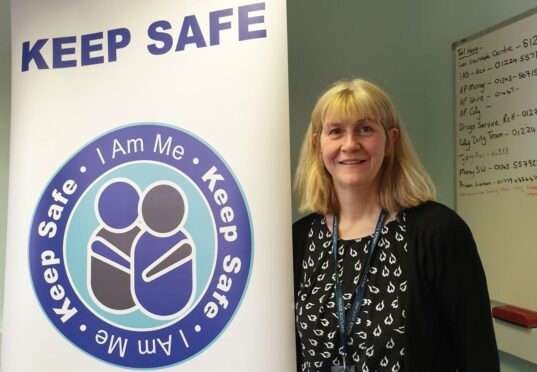As the Adult Protection Coordinator for Police Scotland’s North East Division, Alison Lynch is based within the Harm Reduction Unit and has worked with the police for more than 30 years in various roles – she has been the Division’s Adult Protection Coordinator since 2012.
My main role is to work with the police, all three councils in the north-east, NHS Grampian and third sector organisations to make sure those in our communities who are vulnerable and are being harmed by others get the support they need.
I also raise awareness of the different types of financial harm and the signs to look out for to help spot if someone could be being financially harmed.
Adult protection is not just for older people – people of any age can be vulnerable due to many different conditions.
These can in include physical disabilities, illness, mental health issues, cognitive impairment or a learning disability.
My role can have its challenges, for example when you hear of the horrendous abuse someone has faced, or when the need for support is recognised and offered to an individual, but for whatever reason they do not engage.
However it can also be very satisfying when you know that working together as a partnership has improved the quality of life for an individual at risk.
Types of harm can be wide ranging
Abuse and exploitation can affect people regardless of age, gender, orientation, ethnicity, religion and race, and the impact can be devastating, often with lifelong consequences.
The type of harm that can be experienced is wide ranging too, with the two most common types reported being physical harm and financial harm. Harm can be committed by anyone – a friend, family member, carer or even a stranger.
Protecting or supporting those most at risk of harm can be complex and challenging, and remains a key focus for policing and our partners.
Ultimately we want to prevent these crimes from occurring, but we can’t achieve this alone. Protecting people from harm is not just about policing – it is the responsibility of each and every one of us, across all of Scotland’s communities, to watch out for vulnerable people who may be at risk and to report your concerns to someone who can help.
Due to their vulnerability, the person being harmed may not be able to report it so it is vital that communities look out for them and report anything you think is not right.
Have you seen unusual visitors or workmen going into someone’s house? Have you seen someone at the bank or ATM in unusual circumstances? Does it appear as though they are being pestered by someone? Do they have unexplained scratches, bruising or other injuries?
Like child protection, we all have a duty to prevent vulnerable adults from being harmed by others so if you suspect that someone is at risk, please report it as soon as possible to police using 999 if you feel they are in danger and it is an emergency, or for non-emergencies call 101.
Police Scotland to highlight to highlight adult protection
Reports can also be made anonymously through Crimestoppers on 0800 555111 or via their Anonymous Online Form on the Crimestoppers website.
Police will make criminal enquiries into all reports and will also alert the Adult Protection Team in the appropriate local authority so they can carry out Adult Protection enquiries.
Adult Protection Day is on February 22 and, starting today, Police Scotland and our partners are posting messages about Adult Support and Protection, the different types of harm and where you can report any concerns too.
This will conclude with a live online webchat hosted by Police Scotland on Monday February 21 between 2 and 4 pm, where a team of professionals in the adult protection field will be on hand to answer questions and give advice.
